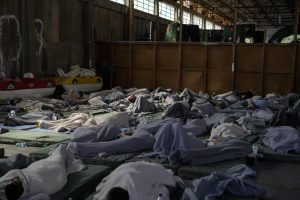On April 12, nine men were shot and killed after being abducted from a bus heading toward Iran on the Quetta-Taftan Highway in Pakistan’s southwestern province of Balochistan. According to witnesses, the identity cards of all passengers on the bus were checked, and those from Punjab were taken off the bus and shot dead.
A separatist group claimed responsibility for the incident. It said that those killed were intelligence operatives. However, Pakistani authorities refuted the allegation and said that “they were laborers heading to Iran.”
The incident drew attention once again to the unceasing ethnonationalist conflict between Balochistan province and the state. It also turned the spotlight on another pressing problem in Pakistan — human smuggling via Balochistan.
Many believe that those on board the bus that was involved in the April 12 incident were heading to Iran for onward travel to Europe via Türkiye and the Mediterranean Sea, a commonly traversed human smuggling route.
It is estimated that between 80,000 and 100,000 Pakistanis cross international borders illegally each year. These migrants include both those smuggled as well as those who are victims of trafficking.
Human smuggling typically involves consensual arrangements between migrants and their “agents,” whereas human trafficking involves coercive practices, subjecting those trafficked to bonded labor and sexual exploitation.
Human smugglers use land, water, and air routes outward from Pakistan. The land and sea routes primarily run through the sparsely populated and conflict-ridden Balochistan province. There are multiple land routes and they all end up either at the Taftan (Iranian) border in the north of Balochistan province, or run through the southern district of Kech bordering Iran. Migrants from different parts of the country head to Quetta or Karachi before they take the land route abroad.
As for the sea route, it begins from the port city of Gwadar or the nearby coastal villages of Surbandan, Pishukan, Jiwani, and Pasni, where migrants travel in boats to Iran through the Arabian Sea entering the Persian Gulf.
In June 2023, fishermen on the western coast of Ormara in Gwadar district reported a floating wooden box containing two dead bodies. The word “Help” was written on the box. Unfortunately, the box was not found in time to save the lives of the two people in it. Local police claimed that the bodies were those of illegal migrants.
Over the years, there have been several instances of overcrowded and unseaworthy boats either going missing or sinking. In many of these cases, local fishermen found dead bodies washed ashore. Authorities often suspected the bodies to be those of illegal migrants. These migrants had met their end close to home, long before they even set foot on their final destination, Europe.
Others have perished far from home in Mediterranean waters. In June 2023, for instance, one of the deadliest shipwrecks in the Mediterranean claimed the lives of over 200 Pakistanis. Most of them had paid hefty amounts to “agents.” They had begun their journey either by sea from Balochistan or via air through Karachi, boarding to Dubai, onward to Libya and then onward to the Greek coast. But just miles away from their final destination, they lost their lives.
Although there have been so many horrifying incidents, human smuggling is still thriving in the region.
According to the United Nations Office on Drugs and Crime (UNODC), Pakistan is one of the world’s largest countries of origin for smuggled migrants, and Balochistan is a major point of departure in South Asia. The land and sea routes of Balochistan are operated by national agents and transnational chains and “brokers” that provide “services” to the victims. Organized networks and subnetworks of smugglers operate in different parts of the country,
The vast majority of human smuggling networks operate in Punjab. Most of those who seek to leave Pakistan are from this province. Another large number of networks exist in Balochistan, which is the point of departure for all migrants from Pakistan.
Although these networks operate undercover, they are easily contacted – which is why thousands of people fall victim to them. Poverty, unemployment, and insecurity drive people to these smugglers. They are willing to risk their lives in search of a better life.
Since 2000, Pakistan has signed several international conventions against human smuggling. Although Pakistan’s National Assembly passed the Prevention of Smuggling of Migrants Act in 2018, the law has hardly made any difference as human smuggling continues to flourish.
While the Federal Investigation Agency (FIA) is the primary institution responsible for implementing the law, other institutions and agencies like the Frontier Corps and Balochistan Levies as well as coast guards and local police, although not specifically mandated to address migrant smuggling, are also considered important stakeholders for border control and irregular migration.
But, despite the presence of a large number of security personnel in Balochistan on account of the armed insurgency there, curbing human smuggling remains a major challenge. This is because of the close links between smugglers and law enforcement agency officials, according to a UNODC study.
While the failure of law enforcement at the national level and the lack of protection for migrants at the international level are major reasons for the persisting problem of human smuggling, the problem is not just a matter of law enforcement.
The conditions that drive people to make the deadly journey from Balochistan – whether to escape conflict or economic dire straits – need to be addressed as well.

































